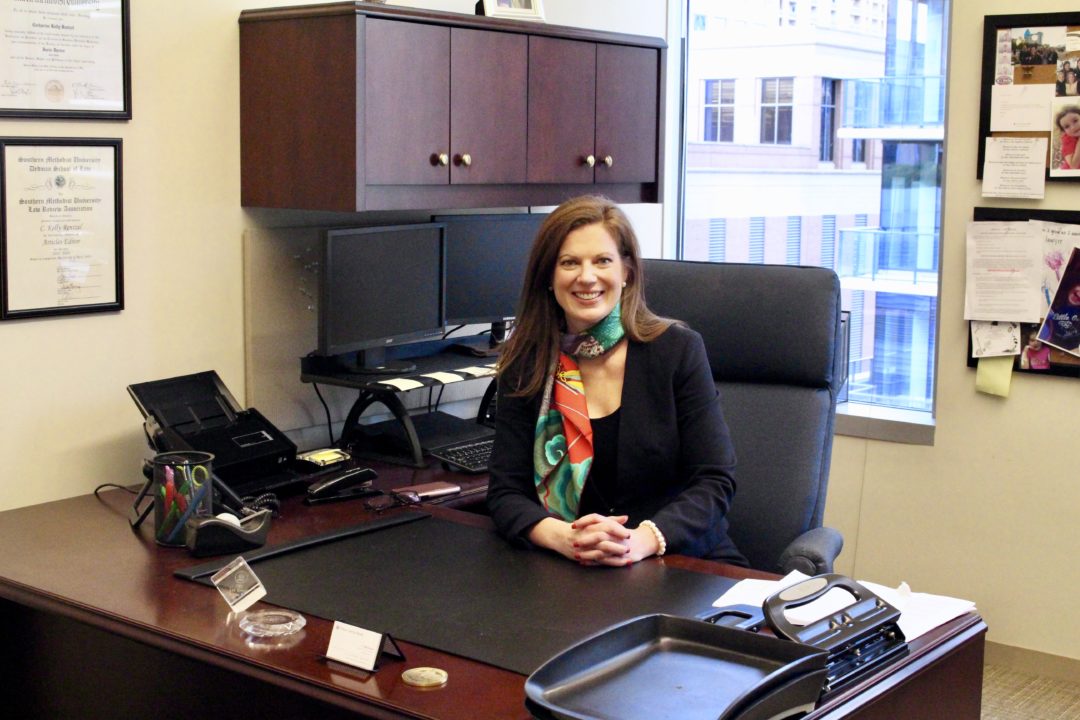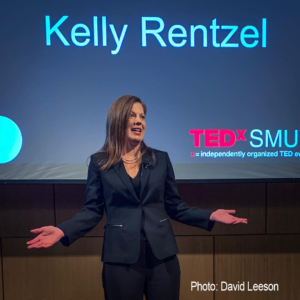
On a fall day in 2016, Kelly Rentzel went to work and had one of the most rewarding yet terrifying days of her life.
Rentzel’s boss, Texas Capital Bank CEO Keith Cargill, came into her office and told her that he wanted to promote her to general counsel. Rentzel had joined Texas Capital four years earlier as the bank’s very first in-house lawyer.
She was thrilled by the news but also scared. Although it meant she would reach a new peak in her successful legal career, it also meant she would have to disclose a mental illness to her employer that she had planned to begin talking about publicly.
Just a few days earlier, she had finished a manuscript that she had been working on for two years about her journey with Bipolar I disorder. Aside from family and close friends, nobody knew of Rentzel’s condition, which included a few hospitalizations and a suicide attempt.
She took a leap and told the bank – and after, the world – about her condition. Though it was a valid fear, her career did not go down the tube.
She still has her job and has grown the once-nonexistent in-house legal department at Dallas-based Texas Capital to four lawyers. As GC, Rentzel manages the day-to-day legal affairs at a bank that has tripled in size since she joined six years ago – from $9 billion in assets to $28 billion today.
But perhaps most importantly, she is making significant strides in changing the dialogue of mental illness in the legal profession and beyond one public appearance at a time.
All of these factors are reasons why the Association of Corporate Counsel’s Dallas-Fort Worth Chapter and The Texas Lawbook have named Rentzel as a finalist for the 2018 Outstanding Corporate Counsel Community and Public Service Award.
The Outstanding Corporate Counsel finalists and winners will be honored on Thursday, Jan. 24 at the Bush Institute.
“Kelly is bipolar, and she recently has had the courage to begin speaking about practicing law with a mental illness – this is a huge service to the legal profession and the community at large,” said Alston & Bird partner Sanford Brown, who nominated Rentzel for the award. “She’s a brilliant lawyer who has overcome a tremendous disadvantage to lead the law department of one of the best and largest home-grown banks in Texas.”
Diagnosis and Journey to Becoming a Lawyer
Born to Dallas’s University Park neighborhood, Rentzel says she was reared by “a pack of lawyers,” including her father, Chris Rentzel, who is a commercial litigator at Bracewell.
“Fortunately, my mom was not one of them, so I did get some idea of the other side of the world,” she said of her mother Cathy Packard, who spent her career working in nonprofits.
A great influencer of Rentzel’s love for reading and writing came from her grandfather on her mom’s side, who would bring crossword puzzles for them to work on together when he visited.
“He would draw a line in the middle of the crossword and say, ‘You do the left side and I’ll do the right side,’ and we would time ourselves,” Rentzel said.
A “voracious reader” and “total Renaissance man,” Rentzel said her grandfather would read Shakespeare while he served in the Navy on submarines. Although his background was engineering as a nuclear submarine designer (he received an advanced degree from MIT), Rentzel said he also wrote two unpublished books – one in the 1980s about what women add to the workforce.

Rentzel attended Rice University and double-majored in English and managerial studies, which she described as the school’s closest equivalent to a business major since at the time Rice did not have an accredited business school.
In the fall of her senior year, Rentzel found out she had bipolar disorder when she suffered a severe manic episode, during which she stayed up for four days without sleep and temporarily lost her ability to read.
She was hospitalized for a month but returned to Rice for her spring semester in 1997, managing to still graduate on time, with honors and with a double major.
Rentzel stayed in remission for 14 years, during which she attended law school at Southern Methodist University on a full ride scholarship and launched her legal career.
She said she decided to become a lawyer because she viewed the law as a safer outlet for her word skills than creative writing, which she worried had been a trigger of her manic episode in college.
“People had warned me that legal writing was different from the writing that an English major would do, and I found that was absolutely incorrect,” Rentzel said. “Clear writing from a logical mind is appreciated anywhere, including law school.”
She graduated from SMU Dedman School of Law in 2002 and began her career as a litigation associate at Baker Botts. One evening, after working in the trenches on a difficult two-week trial, a partner called at 10 p.m. asking an already sleep-deprived Rentzel to write a motion for judgment as a matter of law. He said he needed the motion by 7 a.m.
Rentzel pulled an all-nighter getting the motion done. The trial judge granted Rentzel’s motion, which she said “ended up saving the client millions.” But it came at a cost.
“It was defining in that it was a very clear message to me that I was really good at what I did, but almost to my detriment,” Rentzel said.
Like eating sugar is bad for diabetics, chronic sleep deprivation is dangerous for people with mood disorders. It’s the surest indicator that a mood disorder is present. Some studies have suggested sleep deprivation can even trigger a mood disorder.
Rentzel worried that staying in big law would put her at risk of a manic relapse; the all-too-familiar sleepless nights writing English papers in college, had, after all, preceded her bipolar diagnosis.
“That’s when I learned my work matters, but my life matters more,” she said. “That was before the days when mood disorders were included in the Americans with Disabilities Act. I kept quiet about my condition. If I had told somebody, maybe it would have been different… but the culture wasn’t there to rely on.”
Rentzel began looking for another job and eventually ended up working in the Dallas federal courthouse as a staff attorney, primarily for former U.S. Magistrate Judge Jeff Kaplan.
While there, she spiraled into postpartum depression after having her daughter, Catie. Having to stay off her medication to safely conceive and breastfeed made her increasingly vulnerable on top of the chronic sleep-deprivation of motherhood.
When her postpartum depression failed to fully resolve, she fell into a major depressive episode and in June 2012, she tried to end her life by drowning herself in her bathtub.
While hospitalized after her suicide attempt, Rentzel received four life-saving rounds of electroconvulsive therapy (ECT) after her doctors determined she was resistant to medication. Only two months later, she went through a second round of interviews to become Texas Capital Bank’s first in-house lawyer. She got the job and started in October 2012.
Life at Texas Capital
When she began at Texas Capital, Rentzel’s role primarily entailed answering subpoenas and garnishments that got served on the bank and handling small litigation. She was told to not be offended if the C-suite executives never enlisted her for the bank’s big cases because it was their practice to manage them on their own and take them directly to their outside lawyers.
Her best day on the job came when the opposite happened.
“It was a pivotal moment in my bank career when the president of the bank came into my office with a bunch of red ropes folders and put them on my desk and said, ‘I’m so glad you’re here,’ ” she said.
After two years, Rentzel expanded Texas Capital’s legal department to two lawyers when she added Erica Dorsett, a friend from the courthouse.
When she became general counsel in 2016, Rentzel expanded the legal department by two more lawyers, Laura Byrd and Lesley Ardemagni.
Today, she’s proud of the culture of accessibility her legal department exudes to the rest of the bank. She greatly credits her department’s annual Halloween shows for that. Each year, the lawyers put on a performance to convey a different legal theme. One year, they sang “Eternal Mail,” an ode to The Bangles’ “Eternal Flame” that discussed the do’s and don’ts of email in the “everything is discoverable” modern world.
“People come up to me and say, ‘I almost said something [in an email] but I didn’t because I remembered your song,’ ” Rentzel said. “I am very proud that my team and I have gotten involved with people all throughout the bank and have created an atmosphere of accessibility and service-oriented work.”
Rentzel said the people at Texas Capital are what keep her motivated at work.
“They are just very ethical people and it’s heartening to me to work in a bank where the people care about each other,” she said.
Also: “They deeply care about their customers. They want to do right by them, and they care about relationships inside and outside the bank.”
That support was crucial when she opened up about having bipolar disorder and her plans to go public.

“I have had people ask me whether I’m concerned I will lose my credibility, and of course that makes it much more necessary for me to be on point all the time,” she said. “I have to hold myself up to a higher standard, and I know I have to meet that higher standard in order to prove myself against the doubters. I can’t be the person who kicks the coffee machine or breaks it.”
She credits CEO Keith Cargill and Cara McDaniel, Texas Capital’s director of HR, for making Texas Capital a “safe place” for Rentzel to open up.
“They showed so much trust in me,” she said. “They were the ones who would have to face repercussions if something went wrong.”
Fortunately for Rentzel, the opposite occurred.
At the advisement of a PR professional, Rentzel decided to disclose her condition to the world through speaking engagements instead of publishing a book (though that may happen in the future), and delivered her first talk in August 2017 at the Dallas Bar Association’s North Dallas Clinic.
After a couple more speaking engagements, she launched a website last March called Bipolar Oz. The website tells her story and provides a safe space for other “normal” people with bipolar disorder to share their stories. She calls the effort the “Bipolar Bio” project.
She said she’s received overwhelming feedback from law firm partners – and even a fellow general counsel – recounting their own experiences with bipolar disorder. She’s even beginning to have an international reach. Several weeks ago, she received a message from someone in Melbourne, Australia who had visited her website.
“My goal really was just to open the dialogue,” she said. “I hope other people don’t view it as, ‘Well Kelly has already done this, so I don’t need to do anything else like this.’ Every person who can get across the finish line in their life [and share] what they’re seeing, they’re helping the whole group.”
Editor’s note: The Texas Lawbook previously published an in-depth piece that provided more detail on Rentzel’s experience with bipolar disorder. To read it, click here.
